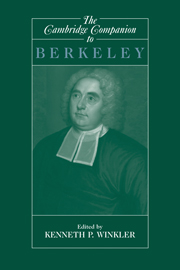Book contents
- Frontmatter
- Introduction
- 1 Berkeley’s life and works
- 2 Was Berkeley an empiricist or a rationalist?
- 3 Berkeley’s notebooks
- 4 Berkeley’s theory of vision and its reception
- 5 Berkeley and the doctrine of signs
- 6 Berkeley’s argument for immaterialism
- 7 Berkeley on minds and agency
- 8 Berkeley’s natural philosophy and philosophy of science
- 9 Berkeley’s philosophy of mathematics
- 10 Berkeley’s moral and political philosophy
- 11 Berkeley’s economic writings
- 12 Berkeley on religion
- Appendix
- Bibliography
- Index
6 - Berkeley’s argument for immaterialism
Published online by Cambridge University Press: 28 August 2006
- Frontmatter
- Introduction
- 1 Berkeley’s life and works
- 2 Was Berkeley an empiricist or a rationalist?
- 3 Berkeley’s notebooks
- 4 Berkeley’s theory of vision and its reception
- 5 Berkeley and the doctrine of signs
- 6 Berkeley’s argument for immaterialism
- 7 Berkeley on minds and agency
- 8 Berkeley’s natural philosophy and philosophy of science
- 9 Berkeley’s philosophy of mathematics
- 10 Berkeley’s moral and political philosophy
- 11 Berkeley’s economic writings
- 12 Berkeley on religion
- Appendix
- Bibliography
- Index
Summary
Berkeley's philosophical view is often described as an argument for “immaterialism”, by which is meant a denial of the existence of matter (or more precisely, material substance). But he also, famously, argued in support of three further theses. He argued for idealism, the thesis that mind constitutes the ultimate reality. He argued that the existence of sensible things consists in their being perceived. And he argued that the mind which is the substance of the world is a single infinite mind - in short, God. These are four different theses, but they are intimately connected in Berkeley's presentation of them, the arguments for the first three sharing most of their premisses and steps. My chief purpose in what follows is to give an account of these arguments, their interactions, and the assumptions and methods underlying them. Doing so makes their strengths and weaknesses both conspicuous and perspicuous.
- Type
- Chapter
- Information
- The Cambridge Companion to Berkeley , pp. 166 - 189Publisher: Cambridge University PressPrint publication year: 2005
- 3
- Cited by



